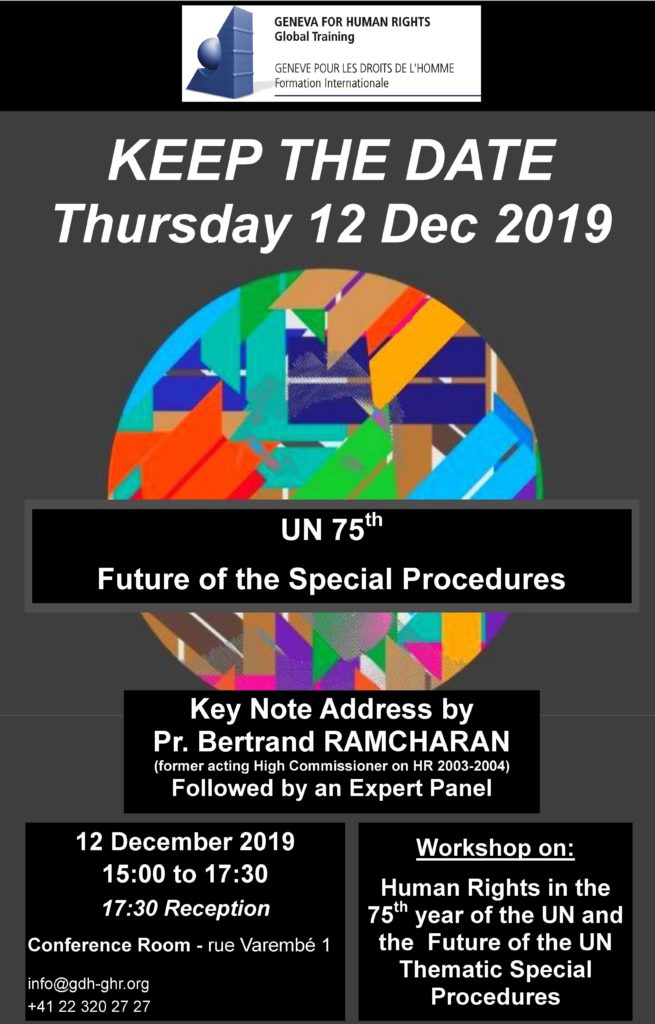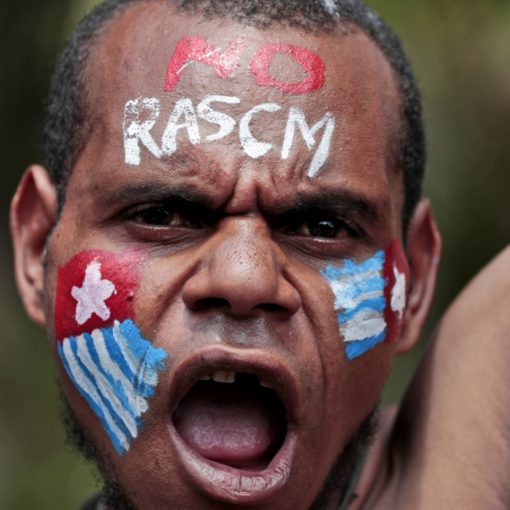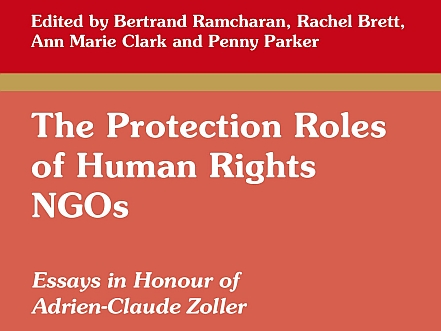Key Note Address by Pr. Bertrand RAMCHARAN , (former acting High Commissioner on HR 2003-2004)
Followed by an Expert Panel
Concept Note and Outline available on demand at : info@gdh-ghr.org
Workshop on human rights in the 75th year of the UN and the future of the UN Special Procedures
(Draft outline – Rev. 6.12.2019)
Background
2020 marks the 75th Anniversary of the Organisation of the United Nations (UN). For several years now, authoritarian and populist regimes have been challenging the UN human rights system. While a reform process of the treaty monitoring bodies is taking place, hardliner States have increased pressure to weaken the system of the Special Procedures.
The UN human rights mechanisms and procedures have to be strengthened. During its 2019 session (26th of June), the GHR Assembly launched a brainstorming process on worrying trends regarding the UN human rights mechanisms and procedures. The Workshop, which will take place on the 12th of December, is part of this process.
75th Anniversary and challenges to the UN
As experts noted during the June 2018 Expert Seminar of Geneva for Human Rights (GHR) on the World Conference’s 25th Anniversary, the international human rights system remains weak because of a lack of effective implementation. The realisation of rights depends on States. They have to develop national capacities, to create domestic protection mechanisms, and to promote, where possible, the cooperation between State and civil society.
The Workshop aims to reflect on the future of the UN Special Procedures within a broader framework, that of the challenges facing the UN. As key-note speaker Prof. Ramcharan recently wrote: ‘The seventy-fifth year of the UN finds the world organization’s human rights pillar, like the other three pillars – peace, development and justice, in the throes of crisis, change and challenge – and unfortunately there is little policy-oriented thinking to be seen in or out of the world body to help steer a course for the future. The crisis is one of severe lack of implementation of both economic, social and cultural rights and civil and political rights. In fact, gross violations are rampant of all of these rights. In the face of these severe violations Governments have largely turned their faces on principled denunciations of gross violations and instead argue for approaches favouring ‘dialogue and cooperation’ – even if human beings are undergoing wrenching atrocities. The ethic of accountability is largely absent’.
Focus on the UN Special procedures
Over the last 75 years, the UN, along with other IGOs, has adopted many human rights principles, declarations and conventions. Several monitoring mechanisms and procedures have been set-up by the UN, in particular the UN special procedures and treaty bodies. These have proven to be effective !
Unsurprisingly, States under scrutiny are actively involved in initiatives to weaken this system, even though it was unanimously confirmed at the 1993 World Conference. In the eighties, hard-liner States obtained the dismissal of a Director for Human Rights. With a series of initiatives in the nineties, they silenced the Sub-Commission, with its expertise subsequently suppressed in the new Human Rights Council (‘HR-Council’), into which many such States have succeeded in getting elected.
To prevent criticism, hardliners regularly recall in the HR-Council the principles of ‘national sovereignty’, territorial integrity’ and ‘non interference’, as Latin American dictatorships did at the end of the seventies. The new rules are ‘dialogue’ and ‘cooperation’, which, while undoubtedly useful to promote implementation in certain situations, also constitute a convenient way for violators to protect themselves. At the same time, hardliners attempt to impose their version of events, which they present as ‘reliable information’. With propaganda reports; large and shameful exhibitions in the UN buildings presenting fake information; disruption of NGOs conference; and side-events of new pro-governmental NGOs, currently, a main challenge facing the HR-Council is that of a battle for the truth.
Having solved their grievances regarding the Sub-Commission, hardliner States have since targeted the main sources of information for the HR-Council, namely NGOs and Special Procedures. The space is narrowing for NGOs, victims, witnesses, human rights defenders and organizations to submit reports and complaints, which are an indispensable source of information on what happens in reality, on the ground. Furthermore, reprisals against those contributing to the UN procedures have become common practice all over the world. As a training organisation, GHR regularly expresses its dismay at seeing the defenders it trains becoming a target of repression, merely for their work to promote and protect human rights.
A second target of a growing number of States has been the Special Procedures, which have to respect a Code of Conduct (perhaps more useful for States …). This code was proposed by the Algerian Ambassador and presented by many States as be a condition for accepting the ‘Institution Building Package’ (IBP) of the HR-Council (June 2007).
Over the past years, many Governments, including some Heads of State, have brutally threatened many mandate holders of the Special Procedures. Several visits to countries had to be interrupted, while many member States of the HR-Council have simply refused access into their country. Finally, throughout debates of the HR-Council, State delegations have increased verbal attacks on mandate holders.
Over the years, the Coordinating Committee of the Special Procedures, elected during the annual meeting of the Special Rapporteurs adopted many measures to improve the system. During their June 2019 session, they initiated a process with States and all other stakeholders, proposing improvements to the functioning of the procedures. At the same time, to further increase pressure, China threatened to table a draft resolution. Though it has not been officially circulated the ‘China resolution’ has become a main subject of discussion.
Draft Programme of the Workshop
(Conference Room, 1, Rue de Varembé)
14:30 Welcome, tea, coffee
15:00 – 15:30 Opening by the Chair, Ms. Penny Parker (GHR Board member) and the co-sponsoring organisations)
15:30 – 16:30 Human Rights in the 75th Year of the UN
• Key-note speech of Prof. Bertrand Ramcharan
(former UN High Commissioner ad interim)
• Questions, comments and answers
16:30 – 17:30 Round-table on The Future of the UN Special Procedures
• Introduction on the Origins and Functioning of the Special Procedures
(Adrien-Claude Zoller, President of GHR)
• The effectiveness of Special Procedures for the promotion and protection of human rights
(Invited: NGOs Representatives and lobbyists at the UN-Geneva)
17:30 Closing remarks by Prof. Ramcharan and Ms. Penny Parker
18:00 Drinks offered by GHR
(draft revised 6.12.2019)





